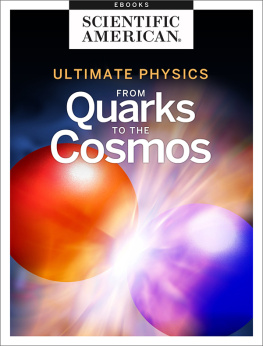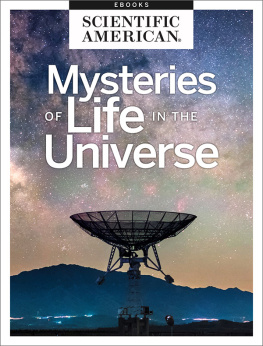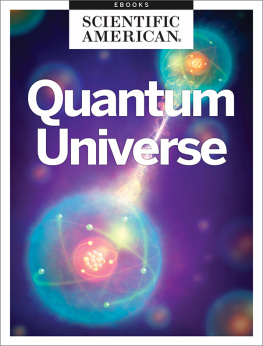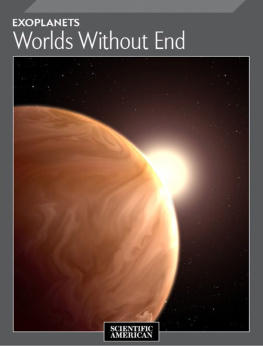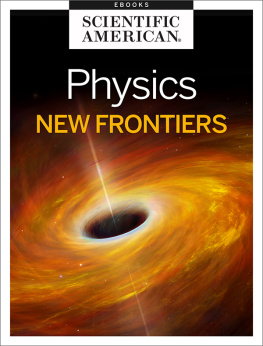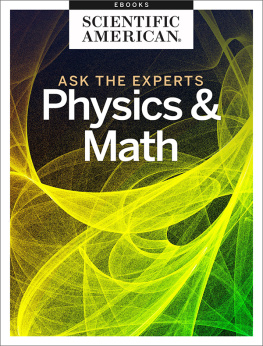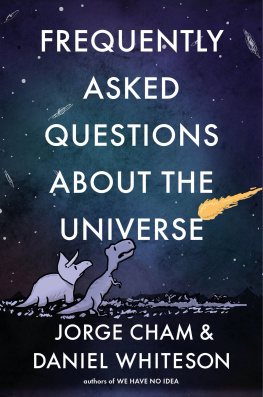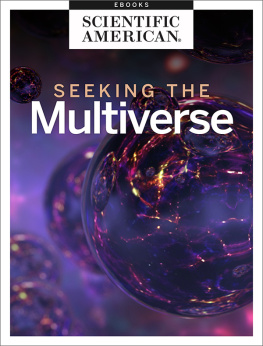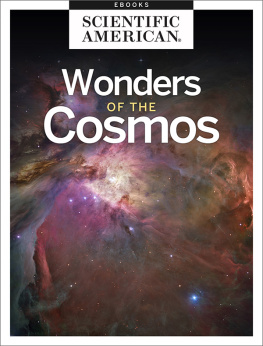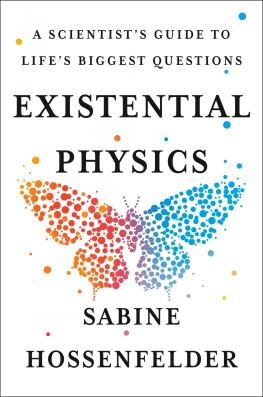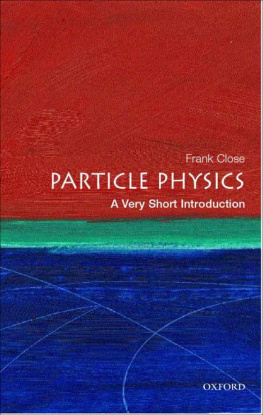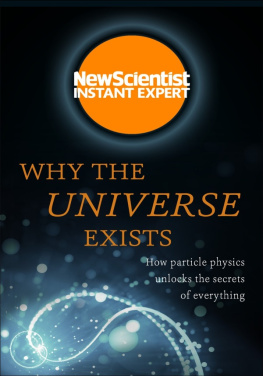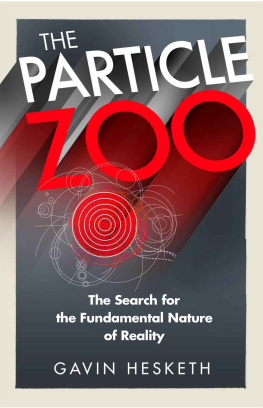Ultimate Physics
From Quarks to the Cosmos
From the Editors of Scientific American
Cover Image: Victor De Schwanberg/Science Photo Library/Getty Images
Letters to the Editor
Scientific American
One New York Plaza
Suite 4500
New York, NY 10004-1562
or editors@sciam.com
Copyright 2017 Scientific American, a division of Nature America, Inc.
Scientific American is a registered trademark of Nature America, Inc.
All rights reserved.
Published by Scientific American
www.scientificamerican.com
ISBN: 978-1-4668-5904-3


ULTIMATE PHYSICS
From Quarks to the Cosmos
From the Editors of Scientific American
Table of Contents
Introduction
by Fred Guterl
Section 1
1.1
by Michael Riordan, Guido Tonelli and Sau Lan Wu
1.2
by Don Lincoln
1.3
by Martin Hirsch, Heinrich Ps and Werner Porod
1.4
by Zvi Bern, Lance J. Dixon and David A. Kosower
Section 2
2.1
by Michael S. Turner
2.2
by Avishay Gal-Yam
2.3
by Leo Blitz
2.4
by Timothy Clifton and Pedro G. Ferreira
Section 3
3.1
by Avery E. Broderick and Abraham Loeb
3.2
by Pankaj S. Joshi
3.3
by Carlos Barcel, Stefano Liberati, Sebastiano Sonego and Matt Visser
Section 4
4.1
by Stephen Hawking and Leonard Mlodinow
4.2
by David Z. Albert and Rivka Galchen
4.3
by David Deutsch and Artur Ekert
4.4
by Peter Byrne
4.5
by the Editors
Infinity's Edge
THE BROADER OUTLINES OF THE PHYSICAL WORLD, FROM QUARKSto the cosmos, have been apparent for decades. Does this mean physicists areabout to tie it all up into a neat package? Not at all. Just when you think youknow everything, the universe begins to look its strangest.
The detection of what seems for all the world to be a Higgs boson illustratesthis idea beautifully. The Large Hadron Collider at CERN near Geneva has providedfodder for physicists from many nations working on a variety of projects but none moreimportant or as eagerly awaited as the confirmation of the Higgs. Our fly-on-the-walllook at scientists poring over data on small perturbations measured with ultrasensitiveinstruments shows clearly how answers lead to more questions. The data appear toconfirm the Standard Model, the theoretical edifice of particle physics, but also revealsubtle and significant ways in which reality diverges from theory, opening up new vistasfor exploration.
Just as physicists thought they had found the smallest building blocks of matterthetiny quarks and leptonssigns have begun to emerge that there are smaller particles still. Proof of their existence would throw physics into complete disarray, however.Further, scientists have never fully understood the neutrinoa ghostly particle that rainsdown on the planet but usually passes through us, and all matter, unnoticed. Theneutrino is therefore another avenue to new inquiries.
On the largest of scales, scientists feel they are closer than ever before to understandinghow the universe began and how it will end. Yet other mysteries are as deep asthey ever were. Dark energy, which helps to explain why the universe continues to expandat an accelerating rate, remains an enduring puzzle. Now some scientists are beginning tosuspect that dark energy does not exist after all. If they are right, basic notions of the universegoing back to Copernicus would need a radical revision.
One of the most compelling intellectual problems of our time remains unsolved: Howdo we tie together the realms of quantum mechanics and general relativitythe very smalland the very large? Such a theory of everything, which has played cat and mouse withscientists for decades, may remain forever out of reach, argue physicists Stephen Hawkingand Leonard Mlodinow. If that makes you sad, consider that quantum mechanics,an Alice in Wonderland theory that seems to impose severe constraints on what we canknow and do, may in fact liberate us by opening a new path to insight. The universemay be finite, but knowledge has not yet been pegged.
--Fred Guterl
Executive Editor
The Higgs at Last
by Michael Riordan, Guido Tonelli and Sau Lan Wu
LATE ON THE EVENING OF JUNE 14, 2012, GROUPS OF GRADUATEstudents and postdoctoral researchers working on the Large Hadron Colliderbegan peering into a just opened data cache. This huge machine at CERN,the European laboratory for particle physics near Geneva, had been producingtremendous amounts of data in the months since it awoke from its winter-long slumber. But the more than 6,000 physicists who work on the LHCstwo largest experiments were wary of unintentionally adding biases to theiranalysis. They had agreed to remain completely unaware of the resultsperformingwhat are called blind analysesuntil mid-June, when all wouldsuddenly be revealed in a frenzy of nocturnal activity.
Many of the young scientists workedthrough that night to untangle the newlyfreed threads of evidence. Although theLHC is a giant collider feeding multipleexperiments, only the two largest onesATLAS and CMShad been tasked withfinding the Higgs boson, the long-soughtparticle that would complete the StandardModel of particle physics, the theoreticaldescription of the subatomicworld. Each massive detector records thesubatomic debris spewing relentlesslyfrom proton collisions in its midst; a detailed,independent accounting of theseremnants can reveal fleeting new phenomena,including perhaps the elusiveHiggs boson. Yet the detectors have to siftthrough the particle tracks and energydeposits while enduring a steady siege oflow-energy background particles thatthreaten to swamp potentially interestingsignals. It is like drinking from a firehose while trying to ferret out a few tinygrains of gold with your teeth.
Fortunately, the scientists knew whatthey were looking for. After the LHCs disastrousstartan electrical splice betweentwo magnets warmed and meltedjust nine days after the LHC came onlinein 2008, triggering a powerful spark thatpunctured the surrounding vessel, releasedtons of helium and ripped scoresof costly superconducting magnets fromtheir mountsthe collider had been collectingreams of data during 2011, enoughto pick up an early hint of a Higgs signal.
After that run ended in October for its scheduled winter shutdown, Fabiola Gianotti, then spokesperson for ATLAS, and one of us (Tonelli), then spokes person for CMS, delivered a special seminar to an overflowing audience in the main CERN auditorium. Both detectors independently found suggestive bumps in the data.
Whats more, these telltale hints of aHiggs boson corroborated one another.Both ATLAS and CMS reported severaldozen events above the expected backgroundin which two photons came blazingout with combined energies of 125 billionelectron volts, or 125 GeV. (GeV is thestandard unit of mass and energy in particlephysics, about equal to a protonmass.) If proton collisions had createdshort-lived Higgs bosons, they could havedecayed into these photons. Each experimentalso found a few surplus events inwhich four charged leptons (electrons ormuons) carried off similar total energies.These could also have been the result of aHiggs. Such a concurrenceof signals was unprecedented. Itsuggested that something real was beginningto appear in the data.

